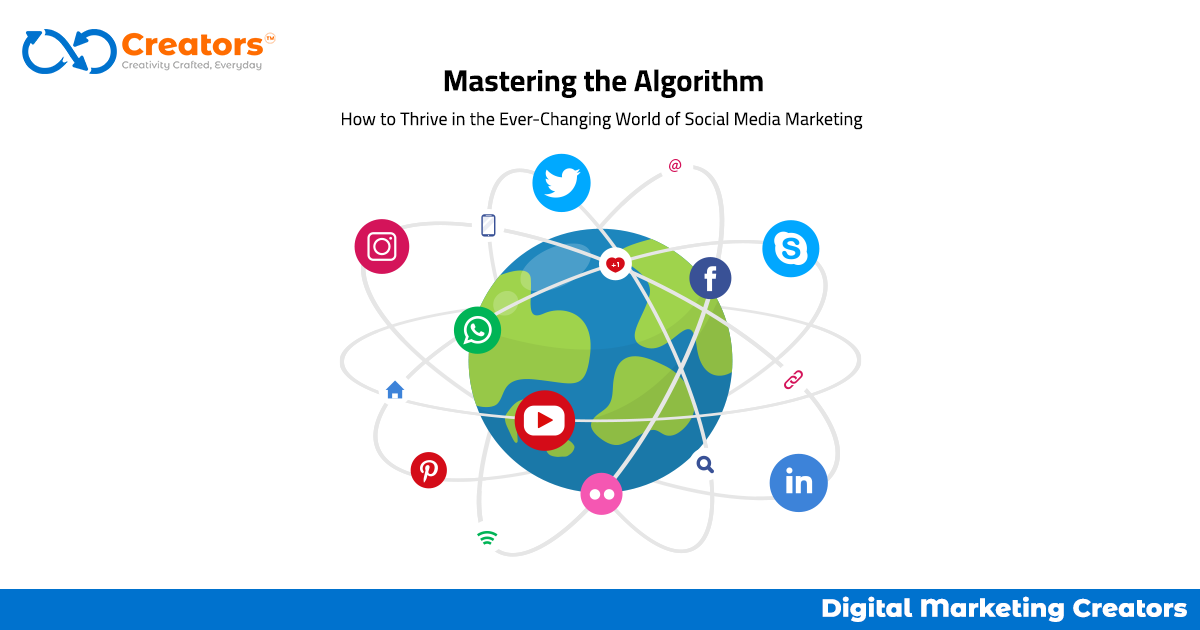How to Thrive in Social Media Marketing World
Social media algorithms are complex systems that determine what content users see on their feeds. These algorithms, integral to platforms like Facebook, Instagram, Twitter, and LinkedIn, are designed to provide a personalized and relevant experience to users. For marketers, understanding these algorithms is key to ensuring their content reaches the intended audience.
Understanding How Different Social Media Algorithms Work:
– Facebook: Prioritizes content that fosters meaningful interactions, especially posts that generate conversations among friends and family.
– Instagram: Focuses on timeliness, user relationships, and interest. Content that a user is likely to care about appears higher in their feed.
– Twitter: Uses a mix of timeliness and engagement to display tweets, with an emphasis on immediacy.
– LinkedIn: Prioritizes content that is relevant and likely to generate engagement, with a focus on professional value.
– Snapchat: prioritizes content based on the user’s interests and interactions. The Discover section shows content from friends, celebrities, and brands that users have shown interest in or interacted with previously.
– TikTok: Heavily influenced by user interactions, such as the videos they like, share, or comment on. The more a user interacts with a certain type of content, the more similar content they will see.
– YouTube: prioritizes videos with higher watch times and engagement (likes, comments, and shares). The more time users spend watching a video, the more likely it is to be recommended.
The Impact of Algorithms on Digital Marketing:
Social media algorithms significantly influence how much visibility and engagement content receives. For instance, Facebook’s algorithm changes in 2018 led to a decrease in organic reach for many pages, emphasizing the need for content that generates genuine user interaction.
Strategies for Adapting to Algorithm Changes:
– Create Engaging Content: Focus on high-quality content that encourages user interaction, like comments and shares.
– Understand Your Audience: Tailor your content to the interests and behaviors of your target audience, increasing the likelihood of engagement.
– Leverage Video Content: Video often has higher engagement rates. For instance, tweets with video see 10 times more engagement than those without.
– Utilize Analytics Tools: Regularly review performance metrics to understand what type of content resonates with your audience and adjust your strategy accordingly.
Success Stories in Algorithm Mastery:
– Wendy’s Twitter Strategy: Wendy’s uses a unique, engaging approach on Twitter, often involving witty interactions with users. This strategy led to a massive increase in engagement, showcasing the power of understanding and leveraging the platform’s algorithm favoring interaction.
– Airbnb’s Instagram Campaign: By focusing on user-generated content and stories, Airbnb has successfully leveraged Instagram’s algorithm, which prioritizes content that generates high user engagement.
– Starbucks #RedCupContest on Instagram: Starbucks’ annual #RedCupContest encourages users to submit creative photos of their red Starbucks cups. This campaign generates massive user engagement, aligning perfectly with Instagram’s algorithm favoring high user interaction.
– Dove’s Real Beauty Campaign: Dove’s campaign focused on real stories and images of beauty, which resonated with their audience, leading to high levels of engagement and shares. This approach aligns well with social media algorithms that prioritize content with higher user interaction and emotional connection.
Algorithm Studies Insights:
– A study by Locowise found that the average organic reach for Facebook posts is about 5.20%, highlighting the challenge for marketers to create highly engaging content.
– Tweets with hashtags receive 100% more engagement, as per a report by Twitter, which is crucial for algorithm visibility.
Challenges and Considerations:
One major challenge is the constant evolution of these algorithms, requiring marketers to continually adapt their strategies. Additionally, the algorithms’ preference for personal over commercial content means that brands must find creative ways to engage organically with their audience.
The Future of Social Media Algorithms in Marketing:
As AI and machine learning continue to advance, social media algorithms are expected to become even more sophisticated in content curation. This evolution might lead to more personalized user experiences and require marketers to be more innovative and authentic in their strategies.
Understanding and adapting to social media algorithms is crucial for digital marketing success. As these algorithms evolve, marketers must focus on creating content that resonates with their audience and fosters genuine engagement to maintain visibility and effectiveness.
Stay ahead in the dynamic landscape of social media marketing with Digital Marketing Creators. Our expertise in adapting to and leveraging social media algorithms ensures your content makes an impact. Contact us to refine your social media strategy and maximize your digital presence.






